BRENT: It’s strange to be back in a time where adventure games can be taken for granted. Thanks to the availability of download services like XBox Live and Steam, and the introduction of platforms like the iPhone, adventure gaming is back in a big way.
However, several years ago the gaming scene was almost entirely devoid of the genre, with the exception of the rare standout title like The Longest Journey. It was a sad time for those of us that grew up with adventure games from Sierra and Lucasarts, and that’s why a little title called Indigo Prophecy was so intriguing to me.
I came across a preview for the game that talked about it being an updated take on the adventure genre, something that used new mechanics and aimed for mature and realistic storytelling as opposed to the fantastic and comedic approach of the games of old. Something more in line with Gabriel Knight, which was always a favorite of mine.
So with great anticipation, I downloaded the demo. I was hooked. I played that demo over and over. It was essentially a single scenario. You wake up in the bathroom of a diner along with a dead body. It’s up to you how you deal with this situation. Do you just bolt from the place? Do you try to hide the body and pretend like nothing is wrong? The implications of what this could mean when drawn out over the course of an entire game were staggering.
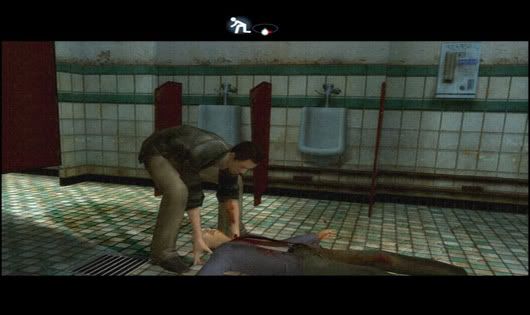
Unfortunately, the final product didn’t quite deliver on the promise. Many of the options you thought you had were simply illusions that had no story impact, the controls were clunky, the dialog and voice acting were laughable in spots, and the ending abandoned the mature and the realistic for some bug nuts sci-fi.
Despite this, the promise behind the game was enough to have me frothing at the mouth for the next game from Quantic Dream and Game Director David Cage. So, needless to say, Heavy Rain has loomed large on my horizon for a while.
DAVE: 2010 is already scheduled to be a huge year for gaming and, I have to confess, Heavy Rain was probably my most anticipated title for this year.
My first experience with David Cage’s games was when you told me about Indigo Prophecy after one of many discussions we’ve had about how great Sierra and Lucas Arts adventure games are and how much we miss them in the current climate of gaming. So, I immediately downloaded and blazed through what was 2/3rds of a great game and couldn’t wait for more. That’s when Cage and the rest of Quantic Dream fed us the first appetizer with their tech demo, “The Casting,” at e3 back in 2006. The Casting is a short little video showing a virtual actress being filmed for an audition for a movie called Heavy Rain. It showcased how incredible the Quantic team are at designing a world and characters out of nothing. Everything about it was absolutely gorgeous. No complaints. Couldn’t wait for more
BRENT: I’m glad you brought up that tech demo. I too think it is absolutely brilliant and it did nothing but heighten my excitement for Heavy Rain. However, it’s also a great example of how David Cage would probably rather be making movies. He reminds me of Hideo Kojima in that way. These are guys that have these bold ideas for stories and a wonderful flair for cinematic storytelling, but they tend to let that get in the way of creating a solid game. I love the Metal Gear series but they can be awfully unwieldy and feature some inelegant game play elements.
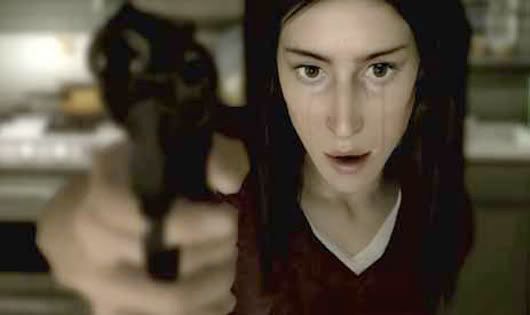
Cage’s games are so much like movies, actually, that it’s hard to really peg down what kind of game they are. Indigo Prophecy and Heavy Rain aren’t exactly adventure games as we know them, insofar as they don’t have inventories or item combining/puzzle solving. You could almost get away with just calling them interactive movies; something more in line with Space Ace or Dragon’s Lair, but that’s not quite right either. They feature plenty of “press the right button to continue the cut scene” moments but they have just as many moments when you are in full control of the character and are free to explore the environment and partake in the wonderfully mundane tasks of life like brushing teeth or opening window blinds. That’s not to mention the branching story aspects generally associated with RPG’s.
What is Heavy Rain?
DAVE: That’s a tough question to answer. On one hand, Heavy Rain is this wonderfully unique experience. It’s only really comparable to Indigo Prophecy, and it’s still quite an evolution from that game. On the other hand, it’s a rather dull b-rated thriller, straight from the bargain bin.
Heavy Rain should have easily been my favorite game of all time. Indigo Prophecy showed that Quantic Dream figured out how to combine the Sierra/Lucas Arts adventure game play with a Bioware story-changing decision branching system and make it work. The fault lies in that it seems like Cage and Quantic got scared of the enormity of what they set out to accomplish so they tacked on a weirdly done sci-fi ending as a way to answer questions they had no answers to.
Heavy Rain feels like David Cage was so fully impressed by his accomplishment that he crowned himself to be a game-film auteur. The game play was totally sacrificed so that his film vision could be fully laid out. It seems like Cage has completely forgotten that he’s making a game, whereas someone like Kojima is fine with letting you be the director of the action, so long as you let him do his thing with the drama and dialogue.
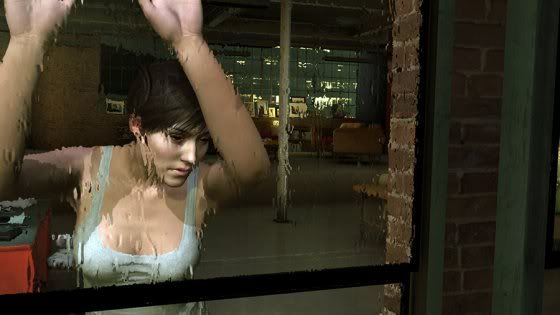
BRENT: I agree in some respects. Cage clearly has a very defined vision and he doesn’t want to sacrifice that by giving the player too much freedom, but he does want them to have some. So the games live in this uncanny valley of player freedom. The more choices we are given, the more noticeable the limitations are. You start to resent that you are playing in his world with his characters and have no real control.
I’d say Heavy Rain does this better than Indigo Prophecy though. I’ve personally played the whole game twice and have played certain chapters more than that just to see what changes I could inflict on the story and I’ve been pleasantly surprised about the endgame differences you can find, whereas Indigo Prophecy was very limited on how much its story would change.
In fact I’d say the various endings of Heavy Rain are handled more effectively than just about any other game I can think of. Something like Fallout 3, which was touted as having an insane number of unique endings, completely falls flat because of how minor the variations of its story are. Heavy Rain has drastically different fates that can befall its characters.
Where it falls short, however, is the stuff that’s happening leading up to the ending. You can attack most the chapters in different ways but the outcome is always the same. One of the best examples is a chapter where you are tasked with cutting off one of your fingers. You are given a wide array of tools with which to accomplish this, but the end result is always the same. It’s also frustrating because the game was advertised, similarly to Mass Effect 2, with the promise that characters can die. However, this is only true in very specific incidents. You can put the controller down and refuse to play along with the quick time events for the majority of the game with no real consequence.
The endgame is the only thing that seems to be highly malleable.
This is again in contrast with Fallout 3, where the endgame was weak and you couldn’t do much to alter it but all the individual quests leading up to it held a ton of variety.
This illusion of choice in Heavy Rain is very frustrating. It tricks me into thinking I’m making a difference, but I’m really just deciding where my character should sit or which direction they should turn.
DAVE: I think the fact that we aren’t really allowed to impose a personality upon these characters is totally the problem. It turns the experience from a game to a “choose your own adventure” movie by only giving you meaningful choices when the shit is going to hit the fan. It, consequently, minimizes all the game play before it. It’s strange, because when I first started the game, the beginning did so much to draw me into the world. By the time that first chapter ends, I totally feel like I’m Ethan Mars.
In a way, I suppose it’s because I had created an internal narrative for Ethan. Do I shave? No, chicks love stubble. Do I shower? Nah, I’m trying to stay green. Plus, I don’t really look sweaty. Do I let Jason win in our sword duel in the backyard? Of course I do. He’s a kid and it’s his birthday. He deserves to win. As I played through the game, my internal narrative just got shoved to the side and my gaming was pretty much reduced to the experience of having to press fast forward on a badly pirated DVD. It was just something I had to do to keep Cage’s story going. Having beat the game, I see the first chapter for what it is, emotional manipulation. I was never Ethan. I was just a dude in a chair at home, watching a movie.
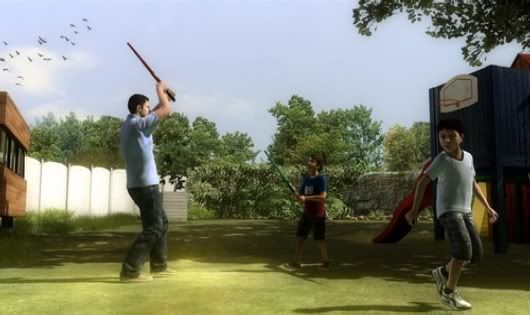
BRENT: It’s interesting that you bring up internal narrative because that is something I had to battle with as well. We are used to games with branching narratives also being games where we can fashion our hero into anyone we like. This is not the case here though. These are well defined characters and our only job is to get them from point A to point B in whatever way we see fit. It’s one of the problems of the game straddling the line between genres, we are unsure how to approach it.
I didn’t have as big a problem with it as you seemed to, however. I loved the moments of just walking around your different character’s homes and just kind of discovering them through mundane action. I grew a connection to the characters by making them pee or shower or get snacks. These actions that I recognize from life humanized the characters and I think it’s what elevates the story past its subpar thriller roots. If I had watched this in theaters (and I do think that the story is good enough to have been turned into a releasable movie) I would not have cared much what happened to the characters. But because I had to mime out the motions of feeding my kid or taking him to the park, I felt a very strong emotional connection that heightened the drama significantly.
I think this is as good a place as any to discuss the game interface, which isn’t always great. I think the fact that we are this far into this discussion without having talked about it is evidence of that.
You interact with your environment through contextual button presses that reveal themselves whenever you come near an object you can do something with. So say you walk by a drawer, you will see an arrow pop up indicating where you should point your analog stick to open it. This works for the most part and does its best to simulate that action. It does get cumbersome at times because these prompts show up in the world and not on some HUD, so your prompts can actually be obscured by items in the foreground.
The prompts are also displayed in a small white font that can make it difficult to differentiate between your different options. This can be frustrating when you press Circle instead of Square because you couldn’t make out the prompt.
The big problem with the game play though is, oddly enough, walking. The game employs a strange walking system that just doesn’t work and I really can’t see any reason why they didn’t use a traditional “move left analog stick to move” method.
DAVE: I think you pretty much nailed the problem with the way you get to interface with the game. I’d almost entirely blame it on the fixed cameras. It seems like Quantic Dream tried to fix the problem by adding a couple of fixed cameras that you could switch through, but never tested them all to make sure the prompts work.
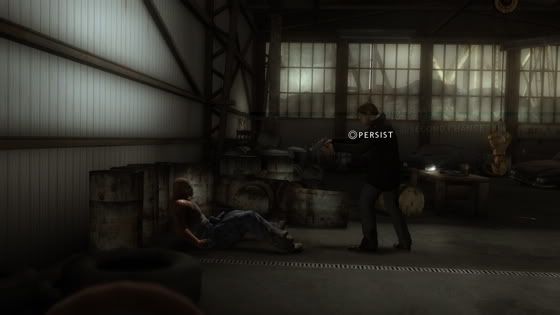
I actually didn’t have a problem with the size of the prompts, but rather the design of them. The prompt for you to press something repeatedly is a square with the name of the button inside. The prompt for you to hold down something is a triangle with a square below it, containing the name of the button to hold. When the situation is tense and all the prompts flash frantically, it’s so easy to mistake one prompt for the other.
The walking seemed to have a lot more finesse than the demo, which you didn’t play. In the demo, the walk and talk Jayden has with Blake is completely ruined because Jayden will veer off into any direction rather quickly. In the finished game, I could slow my roll sufficiently enough to keep up with Blake. So, in the end, my walking was only messed up by a quick change of the fixed camera, which is something anyone who has played Resident Evil or Silent Hill is totally used to.
BRENT: I think another thing that distracts from the prompts is just how amazing the game world looks. During some of the intense action scenes I’m just captivated by the visuals so much that I can’t be bothered to search for the prompts flying around all over the place.
I think the one area where the game doesn’t falter at all is with the graphics. The character models are incredible, I was captivated by the close ups of character’s faces during loading screens. It’s a shame that graphics of this quality aren’t viable for most games since most games have to deal with stuff like physics and draw distances and environmental destruction. This game has none of that stuff to suck processing power away from making things look awesome.

DAVE: The game does look incredible, but apparently it’s so incredible that it’s been known to cause some problems. I guess a fair amount of users complained about the game freezing or there being problems with clipping or being blocked. I know we both had a few problems with clipping or objects lingering when they weren’t suppose to. I only had one incident where it screwed up my game play, but it just made my story go in a different direction, so it wasn’t anything that made the experience unplayable.
BRENT: I also wanted to make special note of the character designs. These look like real people, not the genetically perfect, over designed people generally featured in games. This probably comes from the fact that they were modeled directly off the actors playing the part.
Speaking of the actors, the voice acting is really hit and miss here. This wasn’t produced by an American team and most of the actors are not American, but the setting is in America and they are attempting American accents. The results are not great. At best you don’t notice it, at worst it’s laughable. Overall the voice acting is a step up from Indigo Prophecy though.
DAVE: I totally agree that the character designs are totally incredible. I don’t think I’ve seen a more perfect character in a game than Scott Shelby. Literally everything about that character was done correctly. Everyone else kind of lives in this place of being almost fully realized, which is almost totally to blame on the voice acting. A Brit playing a New York cop in a game directed by a French man was probably not the best call.
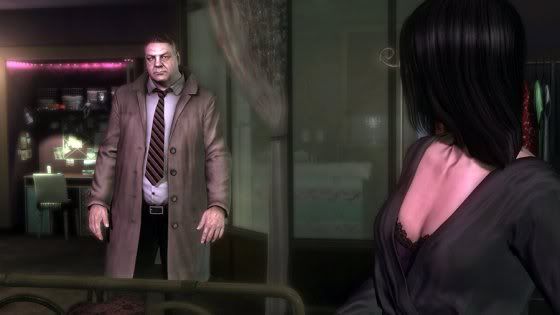
Props also have to be given to the score, which is amazing and does a lot for the atmosphere. It totally rained heavy rain style in Boston the day after I beat this game and I couldn’t stop myself from whistling the main theme while I walked to the train.
BRENT: There was so much about the game world that just felt off. This didn’t feel like an America that I know, it’s slightly other worldly. I attribute this to the culture clash.
I do want to give Cage some props though. His directing and staging is quite good in spots. Some of the action scenes are genuinely exciting. The overall feel of the game is also very effective and atmospheric.
I’m also very happy that the game is so unapologetically adult, in a real sense. Not like something like Gears of War that just equates cursing every other word with maturity. This deals with dark subject matter and treats violence, language, sex, etc in a mature way that you just don’t see in games.
This is also a pretty big step towards acceptance of nudity in mainstream gaming, which I am all for.

And yes, the music is quite good.
DAVE: I can totally see what you’re saying, I just wish that Heavy Rain made me feel like more of an influential force in my experience. In the end, I don’t feel like I did anything to find out who the Origami Killer was. The clues I had to work with pointed in two directions, and if you paid any attention, it was pretty obvious which was the right choice. I felt like more of a tool to trigger Jayden into delivering exposition to explain this choice to me.
BRENT: I’m glad you bring this up. I have to say that the detective portions of the game were by far my biggest disappointment.
The way you gather and analyze your clues is so ridiculously simplified that you don’t feel like you are doing any work at all. It basically points a big arrow at the clue and then tells you exactly what that clue means. It would have been way more compelling to have you do some actual detective work.
However, I think we’ve talked plenty about the game and should get down to brass tacks. How Heavy was this Rain?
DAVE: It could have been heavier. In keeping with the punny, I wasn’t singing in this rain. It was more of a hum. It’s definitely worth a look when you’ve got an evening with nothing to do and no other games to play. I will say that this seems like a good game for anyone trying to tackle the “how do I get my non-geeky girl/boyfriend to let me keep my ps3?” problem. Sit your baby down, make some popcorn, and help Ethan/Jayden/Shelby/Madison make some good or bad decisions together.
BRENT: I’m pretty much in the same boat (which I need because of all the rain), though I may have liked it a bit more than you. I’d have a hard time recommending that anyone buy this at full price but it’s totally worth renting or picking up for cheap. I think it’s a very interesting experience, particularly if you don’t try to delve too deeply into the mechanics and just enjoy interacting with the story being presented to you.
I think it’s a good step forward for Quantic Dream and David Cage and I still hold out hope that they will hit one out of the park in the future.